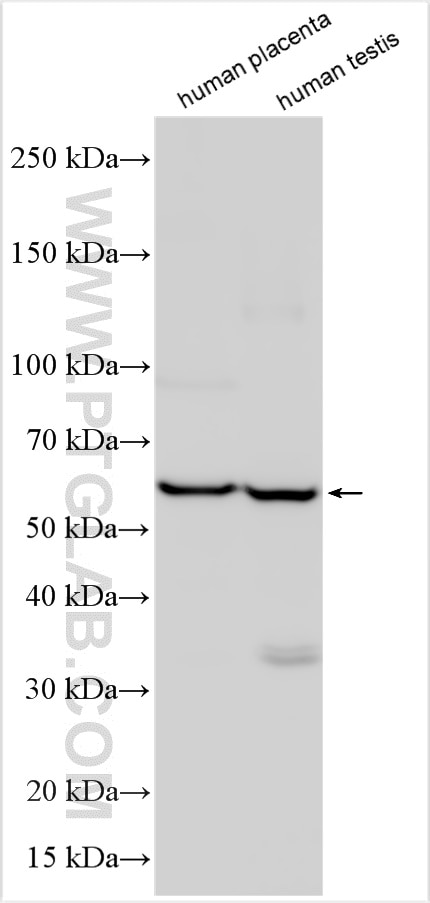Validation Data Gallery
Tested Applications
| Positive WB detected in | human placenta tissue, human testis tissue |
Recommended dilution
| Application | Dilution |
|---|---|
| Western Blot (WB) | WB : 1:500-1:2000 |
| It is recommended that this reagent should be titrated in each testing system to obtain optimal results. | |
| Sample-dependent, Check data in validation data gallery. | |
Product Information
32488-1-AP targets KCTD7 in WB, ELISA applications and shows reactivity with human samples.
| Tested Reactivity | human |
| Host / Isotype | Rabbit / IgG |
| Class | Polyclonal |
| Type | Antibody |
| Immunogen |
CatNo: Ag35756 Product name: Recombinant human KCTD7 protein Source: e coli.-derived, PGEX-4T Tag: GST Domain: 80-220 aa of NM_153033.4 Sequence: PTDSEGRYFIDRDGTHFGDVLNFLRSGDLPPRERVRAVYKEAQYYAIGPLLEQLENMQPLKGEKVRQAFLGLMPYYKDHLERIVEIARLRAVQRKARFAKLKVCVFKEEMPITPYECPLLNSLRFERSESDGQ 相同性解析による交差性が予測される生物種 |
| Full Name | potassium channel tetramerisation domain containing 7 |
| Calculated molecular weight | 33 kDa,289 aa |
| Observed molecular weight | 62 kDa |
| GenBank accession number | NM_153033.4 |
| Gene Symbol | KCTD7 |
| Gene ID (NCBI) | 154881 |
| Conjugate | Unconjugated |
| Form | |
| Form | Liquid |
| Purification Method | Antigen affinity Purification |
| UNIPROT ID | Q96MP8 |
| Storage Buffer | PBS with 0.02% sodium azide and 50% glycerol{{ptg:BufferTemp}}7.3 |
| Storage Conditions | Store at -20°C. Stable for one year after shipment. Aliquoting is unnecessary for -20oC storage. |
Background Information
KCTD7, or Potassium Channel Tetramerization Domain Containing 7, is a member of the KCTD family of proteins. The role of KCTD7 in regulating autophagy-lysosome pathways, which are essential for cellular homeostasis and response to nutrient stress (PMID: 36964131). It has been implicated in several neurodegenerative disorders, particularly progressive myoclonic epilepsy (PME) and neuronal ceroid lipofuscinosis (NCL). The deficiency of KCTD7 results in the accumulation of lipofuscin and lipid droplets, which are hallmarks of NCL (PMID: 33970744). The 62 kDa form most likely corresponds to an SDS-stable dimer (PMID: 22748208).
Protocols
| Product Specific Protocols | |
|---|---|
| WB protocol for KCTD7 antibody 32488-1-AP | Download protocol |
| Standard Protocols | |
|---|---|
| Click here to view our Standard Protocols |

